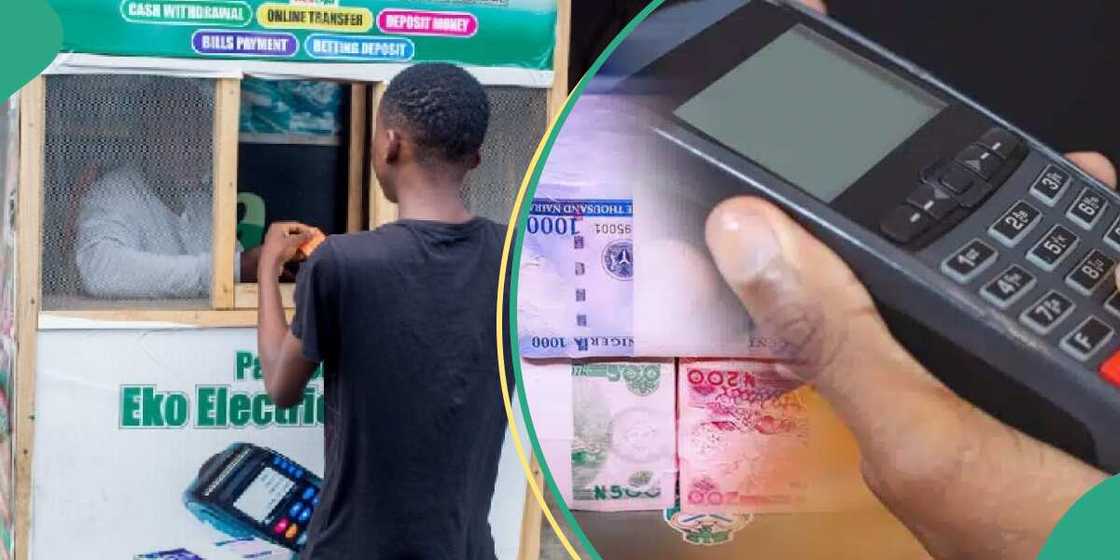In recent weeks, a severe shortage of cash at Automated Teller Machines (ATMs) across Nigeria has forced millions of Nigerians to rely on Point of Sale (POS) operators for their cash needs.
The shift has significantly impacted the financial landscape, benefiting POS operators but raising concerns among analysts over the long-term implications for Nigeria’s banking sector.
Reports indicate that banks in major cities like Lagos, Abuja, and Port Harcourt are increasingly struggling to keep their ATMs stocked with cash.
Long queues outside ATMs have become a familiar sight, with many customers waiting for hours, only to be told that the machines have run out of money. Bank customers have expressed frustration over the persistent unavailability of cash and the operational challenges banks face in maintaining services.
“Over the past month, it has become a recurring issue. ATMs run out of cash by midday, and some don’t even get refilled for days,” said Sola Adebayo, a software engineer based in Lagos. “This pushes us to POS operators, who, while convenient, charge higher withdrawal fees.”
The gaps left by banks have provided a lucrative opportunity for POS operators, who are seeing a surge in business. In most neighborhoods, POS kiosks have become the go-to option for people needing cash quickly, albeit at a premium.
Operators typically charge a service fee ranging from 5% to 10% of the withdrawal amount, which translates to significant earnings for these small business owners.
READ ALSO: NDIC launches nationwide auction of Heritage Bank assets to fund uninsured depositor dividends
“There’s been a marked increase in demand for our services,” noted Musa Lawal, a POS operator in Abuja. “While banks struggle to manage cash flow at their ATMs, we’re seeing more customers every day, which means more profit for us.”
Financial analysts warn that the current situation is symptomatic of deeper challenges within Nigeria’s banking infrastructure. The liquidity crisis at ATMs is partly attributed to a combination of factors, including increased operational costs, currency shortages, and evolving consumer behavior.
Dr. Omolara Fadeyi, a financial consultant, explained, “The surge in demand for physical cash due to economic uncertainty has outpaced the capacity of many banks to respond efficiently. Issues such as currency scarcity and higher logistical costs for cash distribution contribute to the problem. Banks are being pushed to the limit.”
Others believe the rise of POS transactions is reshaping the informal banking sector.
“The boom in POS operations underscores a pivot in consumer behavior, where convenience outweighs cost,” said financial analyst Bola Okafor. “However, the downside is that the higher transaction fees hurt low-income earners the most, putting additional strain on household budgets.”
For many Nigerians, the reliance on POS operators has become a necessary, albeit expensive, alternative. The situation has led to widespread calls for banks and the government to address the root causes of the cash crunch.
READ ALSO: Kaspersky uncovers malware targeting 45 countries, 1,700 Banks
Businesses, particularly small traders who rely heavily on cash transactions, are also feeling the impact. Some have reported a decline in sales as customers become more reluctant to spend their limited cash.
Ngozi Eze, who owns a grocery store in Enugu, shared, “Customers now hold on to cash for essential needs only. People are cutting back on buying non-essential items because of the fees associated with withdrawing from POS.”
Analysts have suggested several measures to mitigate the situation, including the need for banks to improve cash logistics and ensure a consistent supply of currency. “There is an urgent need for the Central Bank of Nigeria (CBN) to step up its oversight and work with commercial banks to address cash distribution challenges,” said Dr. Fadeyi. “Collaboration with fintech solutions and digital wallets could also help bridge the gap and reduce dependency on cash.”
In the long term, experts advocate for the expansion of digital payment systems and improved banking infrastructure. However, for now, the immediate need remains ensuring that ATMs are adequately stocked and operational.

 Entertainment6 days ago
Entertainment6 days ago
 Health1 week ago
Health1 week ago
 Health4 days ago
Health4 days ago
 Football1 week ago
Football1 week ago
 Football1 week ago
Football1 week ago
 Crime5 days ago
Crime5 days ago
 Education6 days ago
Education6 days ago
 Health6 days ago
Health6 days ago

